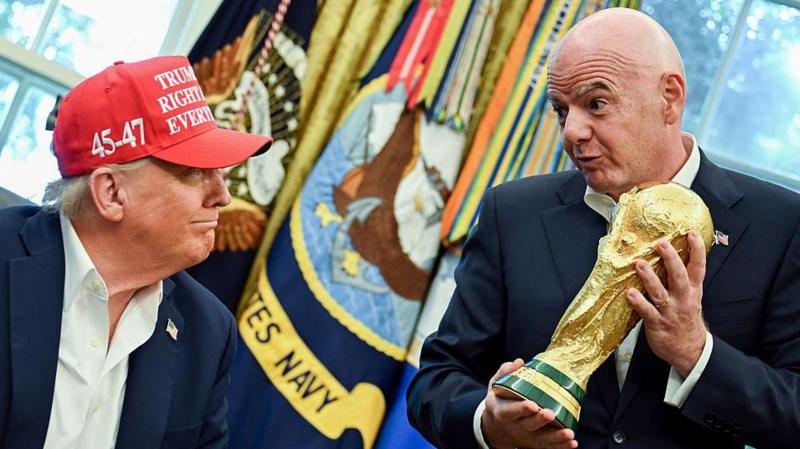Trump Plans to Shift World Cup Games from 'Unsafe' Locations




In a recent statement from the Oval Office, President Donald Trump reassured both the nation and international visitors that the United States will be "safe for the World Cup" next year. The president's assurance comes surrounded by a backdrop of concerns about infrastructure and safety, highlighting his administration's ongoing initiatives to bolster security and facilities ahead of this significant global event.
The World Cup, set to take place in various cities across North America in 2026, is expected to draw thousands of fans from around the globe. The event's scale prompts a massive preparation scheme involving local and federal agencies to ensure safety and operational success. Trump's comments address the dual aspects of readiness and security, which are pivotal not just for the smooth execution of the tournament but also for the international perception of the U.S. as a host nation.
Historically, hosting the World Cup has been a mammoth task that involves extensive planning, from upgrading stadiums to optimizing urban transportation and boosting cybersecurity measures. In the U.S., cities like Los Angeles, New York, and Miami are gearing up to showcase their metropolises on the world stage, further emphasizing the need for tight security measures and state-of-the-art facilities.
Trump's administration has frequently emphasized infrastructure and security, and his recent declaration aligns with ongoing efforts to refine these areas. The pledge to ensure a safe environment for one of the most watched sports events in the world reflects a strategic position to bolster national pride and a sense of unity, while also potentially propelling economic benefits through tourism and global exposure.
The safety of attendees and players can be a complex challenge, incorporating not just physical security but also aspects like health services and emergency responsiveness. Given the ongoing global concerns around health and safety due to past international incidents, the emphasis on a safe and secure World Cup could not be more timely. The administration appears to be taking a holistic approach to these challenges, engaging with multiple stakeholders to cover all bases.
Economic implications of hosting such a colossal event are also significant. Past hosts of the World Cup have seen varied economic outcomes, with increased job opportunities and heightened global visibility often balanced against hefty upfront costs for infrastructure improvements and event organization. For the U.S., a successful tournament could boost tourism sectors and create lasting benefits for host cities.
Moreover, the World Cup offers an invaluable opportunity for cultural exchange and global camaraderie. Events of this magnitude can transcend mere sport, acting as bridges between diverse cultures and nations. In promoting a promised secure environment, Trump may well be nurturing a broader vision of international cooperation and friendship through the universal language of football.
As the countdown to the World Cup continues, all eyes will be on the United States to fulfill its promise of a safe and enthusiastically hosted event. The commitment expressed by President Trump in his recent assurance aims to set a confident tone as preparations ramp up towards one of the most eagerly anticipated sporting events in the world.
In sum, the focus on safety and readiness articulated by the president not only addresses logistical and security concerns but also underscores the broader cultural and economic implications of hosting the World Cup. The preparation for this storied tournament involves intricate planning and cooperation across various sectors, aiming to celebrate not just the sport of football but also the spirit of international unity and friendship it fosters.